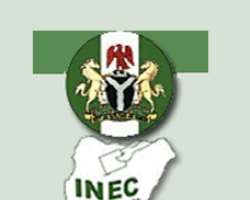2011: INEC BEGINS MOCK VOTER'S REGISTRATION

The Independent National Electoral Commission (INEC) has commenced the demonstration of its Direct Data Capturing Machine (DDCM) meant for the registration of voters. The Commission deployed samples of the machine containing, laptop, camera and embarked on mock registration of its staff to test the efficiency of the machines.
This is even as the contracts for the award of the DDC machines are yet to be perfected as the Due Process office is said to be going through the report of the due diligence conducted on the firms selected for the contract award.
Daily Sun learnt the INEC staff conducting the mock registration exercise had been taken through a week training in the ICT Department of INEC on how to operate the machines. It was observed that it took between five and seven minutes to register a supposed voter.
The print out of the registration card, which is the same size with the National ID Card, contains details such as surname, first name, date of birth, occupation, gender, address, delimitation and date of issue of card. On the back of the voter's card is an embossed map of Nigeria and a Coat of Arm. The thumbprint of the prospective voter is taken but it does not reflect on the card.
Daily Sun was told the exercise, which was supposed to have commenced on Wednesday was marred by series of hiccups bordering on the inability of the designated registration officers to operate the machine and deal with correction of errors in the process of registration. INEC Director of Public Affairs, Emmanuel Umenga, said the machines were the samples of the ones that would be used for the actual registration of voters and that the mock exercise was meant to ascertain the effectiveness of the machines.
According to him, the demonstration was also to ascertain that the machines were designed to the specifications given by the INEC to the manufacturers so that if there was any noticeable fault or inadequacy, the attention of the manufacturers could be brought to it. Umenga said the demonstration was necessary as it would help the Commission know how long it would take to register a voter, adding that so far the exercise had shown it would take an average of four to five minutes to complete the registration of a voter, which INEC is happy with.
Meanwhile, the Commission has said it was not perturbed by the rejection of the Electoral Act Amendment Bill by the Senate over alleged insertion of 'toxic' provisions by President Goodluck Jonathan. Though the Commission's leadership was said to have sought to know the implication of the development from its legal department but on being assured that the fresh amendment to the amended constitution was on course, its fears were allayed.
Kayode Idowu, press secretary to the INEC Chairman, Professor Attahiru Jega, explained that the action of the senators did not in anyway affect the Commission's request for time extension, saying the lawmakers would still go ahead and address the time requirement by the Commission.
'We are really not worried; our plans are on and our programmes are on course. The legislators will still amend the act to allow for our time extension request. What they threw out was the issue of allowing political appointees become automatic delegates at party congresses. 'We have made our request before them and on their own they can oblige us by amending the law. We are not affected at all,' he stressed.
